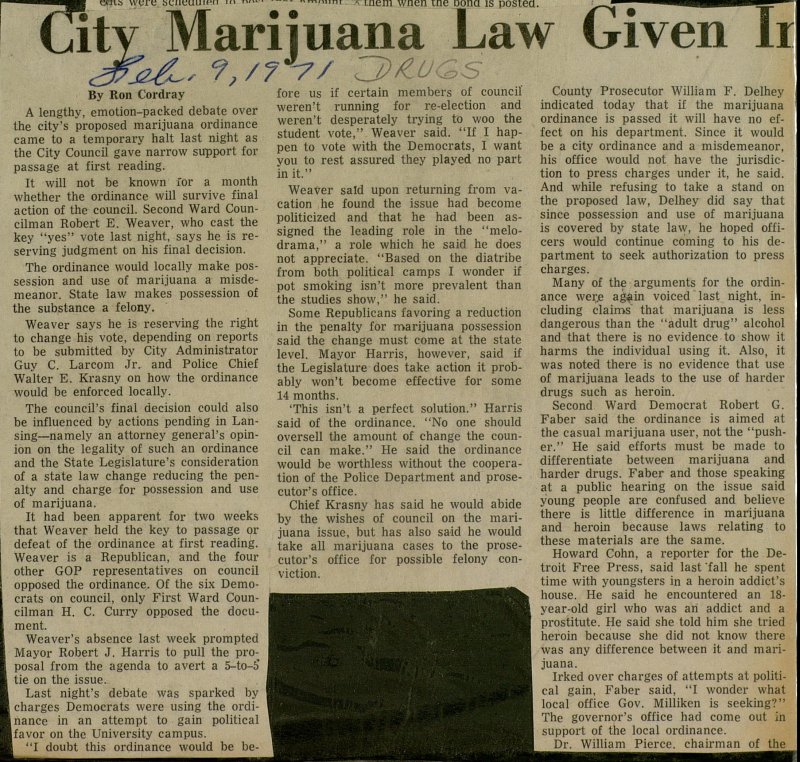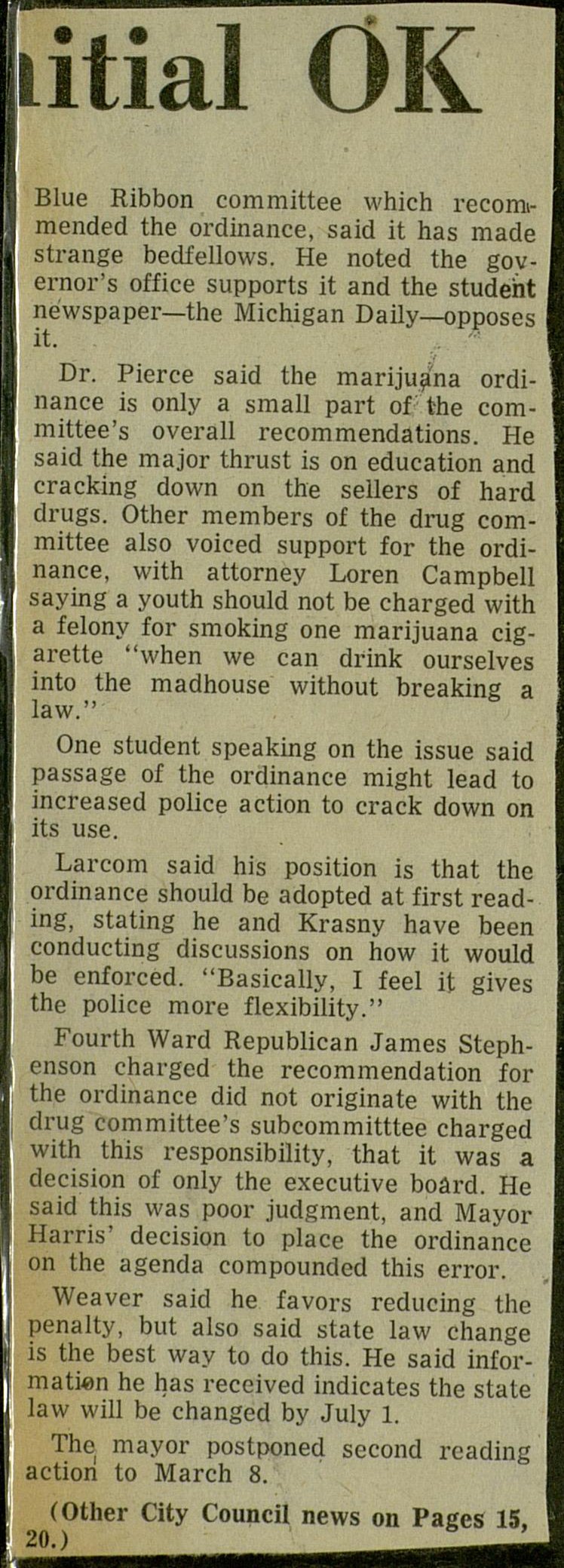City Marijuana Law Given Initial OK


A lengthy, emotion-packed debate over the city's proposed marijuana ordinance came to a temporary halt last night as the City Council gave narrow support for passage at first reading. It will not be known for a month whether the ordinance will survive final action of the council. Second Ward Councilman Robert E. Weaver, who cast the key "yes" vote last night, says he is reserving judgment on his final decision. The ordinance would locally make possession and use of marijuana a misdemeanor. State law makes possession of the substance a felony. Weaver says he is reserving the right to change his vote, depending on reports to be submitted by City Administrator Guy C. Larcom Jr. and Police Chief Walter E. Krasny on how the ordinance would be enforced locally. The council's final decision could also be influenced by actions pending in Lansing- namely an attorney general's opinion on the legality of such an ordinance and the State Legislature's consideration of a state law change reducing the penalty and charge for possession and use of marijuana. It had been apparent for two weeks that Weaver held the key to passage or defeat of the ordinance at first reading. Weaver is a Republican, and the four other GOP representatives on council opposed the ordinance. Of the six Democrats on council, only First Ward Councilman H. C. Curry opposed the document. Weaver's absence last week prompted Mayor Robert J. Harris to pull the proposal from the agenda to avert a 5-to-5 tie on the issue. Last night's debate was sparked by l charges Democrats were using the ordinance in an attempt to gain political favor on the University campus. "I doubt this ordinance would be fore us if certain members of council' weren't running for re-election and weren't desperately trying to woo the student vote," Weaver said. "If I happen to vote with the Democrats, I want you to rest assured they played no part in it." Weaver said upon returning from vacation he found the issue had become politicized and that he had been assigned the leading role in the "melodrama," a role which he said he does not appreciate. "Based on the diatribe from both political camps I wonder if pot smoking isn't more prevalent than the studies show," he said. Some Republicans favoring a reduction in the penalty for marijuana possession said the change must come at the state level. Mayor Harris, however, said if the Legislature does take action it probably won't become effective for some 14 months. 'This isn't a perfect solution." Harris said of the ordinance. "No one should oversell the amount of change the council can make." He said the ordinance would be worthless without the cooperation of the Police Department and prosecutor's office. Chief Krasny has said he would abide by the wishes of council on the marijuana issue, but has also said he would take all marijuana cases to the prosecutor's office for possible felony conviction. County Prosecutor William F. Delhey indicated today that if the marijuana ordinance is passed it will have no effect on his department. Since it would be a city ordinance and a misdemeanor, his office would not have the jurisdiction to press charges under it, he said. And while refusing to take a stand on the proposed law, Delhey did say that since possession and use of marijuana is covered by state law, he hoped officers would continue coming to his department to seek authorization to press charges. Many of the arguments for the ordinance were again voiced last night, including claims that marijuana is less dangerous than the "adult drug" alcohol and that there is no evidence to show it harms the individual using it. Also, it was noted there is no evidence that use of marijuana leads to the use of harder drugs such as heroin. Second Ward Democrat Robert G. Faber said the ordinance is aimed at the casual marijuana user, not the "pusher." He said efforts must be made to differentiate between marijuana and harder drugs. Faber and those speaking at a public hearing on the issue said young people are confused and believe there is little difference in marijuana and heroin because laws relating to these materials are the same. Howard Cohn, a reporter for the Detroit Free Press, said last 'fall he spent time with youngsters in a heroin addict's house. He said he encountered an 18-year-old girl who was an addict and a prostitute. He said she told him she tried heroin because she did not know there was any difference between it and marijuana. Irked over charges of attempts at political gain, Faber said, "I wonder what local office Gov. Milliken is seeking?" The governor's office had come out in support of the local ordinance. Dr. William Pierce. chairman of the Blue Ribbon committee which recommended the ordinance, said it has made strange bedfellows. He noted the governor's office supports it and the student newspaper- the Michigan Daily- opposes it. . - Dr. Pierce said the marijuana ordinance is only a small part of the committee's overall recommendations. He said the major thrust is on education and cracking down on the sellers of hard drugs. Other members of the drug committee also voiced support for the ordinance, with attorney Loren Campbell saying a youth should not be charged with a felony for smoking one marijuana cigarette "when we can drink ourselves into the madhouse without breaking a law." One student speaking on the issue said passage of the ordinance might lead to increased police action to crack down on its use. Larcom said his position is that the ordinance should be adopted at first reading, stating he and Krasny have been conducting discussions on how it would be enforced. "Basically, I feel it gives the police more flexibility." Fourth Ward Republican James Stephenson charged the recommendation for the ordinance did not originate with the drug committee's subcommittee charged with this responsibility, that it was a decision of only the executive board. He said this was poor judgment, and Mayor Harris' decision to place the ordinance on the agenda compounded this error. Weaver said he favors reducing the penalty, but also said state law change is the best way to do this. He said information he has received indicates the state law will be changed by July 1. The mayor postponed second reading action to March 8. (Other City Council news on Pages 15, 20.)
Article
Subjects
Ron Cordray
Republican Party
Michigan Daily
Marijuana laws
Marijuana Ordinance
Laws & Legislation
Drugs
Drug Abuse
Democratic Party
Ann Arbor City Council
Ann Arbor - City Ordinances
Ann Arbor News
Old News
William F. Delhey
Walter E. Krasny
Robert J. Harris
Robert E. Weaver
Loren Campbell
James Stephenson
Howard Cohn
H. C. Curry
Guy C. Larcom Jr.
Gov. William G. Milliken
Dr. William Pierce